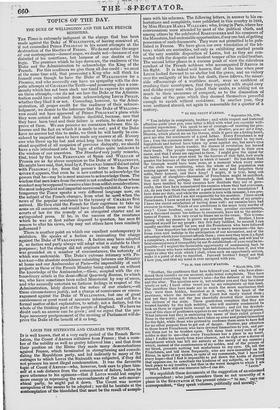TOPICS OF THE DAY.
• THE DUKE OF WF4JINGTON AND THE LATE FRENCIi • MINISTERS.
THE Times is extremely indignant at the charge that has been made against the Duke of WELLINGTON; of having connived at, • it not counselled Prince POLIGNAC in his recent attempts at the destruction of the liberties of France. We do not notice the anger a our contemporary—honest anger, we doubt not—because of our disbelief of his assertions, but because of our doubts of his logic. The premises which he lays down are, the readiness of the Duke and the Administration to acknowledge the King of the French. For this readiness we give them all due credit : we must at the same time add, that possessing a King who will think for himself even though he have the Duke of WELLINGTON for a Premier, and who assuredly can have no sympathy with the des- potic attempts of CHARLES the Tenth—and possessing also a com- munity which has not been slack nor timid to express its opinion on these attempts,—we do not see how the Duke or the Adminis- tration could have refrained from acknowledging Louis PHILIP, -whether they liked it or not. Conceding, however, to the Admi- nistration, all proper credit for the readiness of their acknow- ledgment, we demur to the inference that the Duke of WELLING- TON could not have approved of Prince POLIGNAC'S plans while they were untried and their failure doubtful, because, now that they have been tried and their failure is certain, he does not ap- prove of them. We can perceive no connexion between this in- ference and the fact on which it is made to rest ; and if the Duke have no answer but this to make, we think he will hardly be con- sidered by impartial men to have made any answer at all. If every one who threw up his hat and cried long live the victor, were to stand acquitted of all suspicion of previous disloyalty, we should have a rule introduced into the logic of ethics quite unknown to • the wisdom of our ancestors. The Standard very justly remarks, that, tried by this test, FERDINAND Of Spain and WILLIAM of Prussia are as fax above suspicion as the Duke of WELLINGTON. He might have said, that, tried by it, PoLiGNAC himself did not cabal with POLIGNAC ; for, from that person's letter to Baron PAS- WIER it appears, that even he is now content to acknowledge the powers that be—nay he is most anxious to acknowledge them. The wisdom that men learn from the event is not confined to those whose conduct may be supposed to receive abias from selfish considerations; the most independent and impartial occasionallyexhibitit. Our con- temporary the Times speaks a very different language now, on the subject of the French changes, from what he used when the -news of the popular resistance to the tyranny of Cniiiii.Es first .arrived. He then chid the French for their eagerness to take up arms on all occasions, and would have handed them over to the • courts of law for the remedy of an abrogated charter and an extinguished press. If he, in the success of the resistance which he was at first rather disposed to question, has seen fit reason to alter his views, why may not others have been similarly influenced ?
There is another point on which our excellent contemporary is mistaken. He speaks of a faction as insinuating the charge against the Duke of WELLINGTON. A faction may have adopted it, as faction and party always will adopt what is suitable to their purposes ; but the charge did not originate with any faction ; it was grounded On a number of circumstances, the notoriety of which was undeniable. The Duke's ' extreme intimacy with Po- LIGNAO—the absolute confidence subsisting between our Ministry at home and our Ambassador at Paris—the impossibility of such projects as those of the French Ministry being entered on without the knowledge of the Ambassador,—these, coupled with the ex- traordinary article in the demi-official Quarterly Review, to which we, who have sometimes been called Ministerial by way of sneer, arid who assuredly entertain no factious feelings in respect of the Administration, lately directed the notice of our readers,—all these circumstances justify, not a charge of connivance or encou- ragement against the Duke of WELLINGTON, but one of great carelessness or great want of accurate information, and call for a formal matter-of-fact explanation, to satisfy, not a faction, but the whole of the thinking part of the people of England. We have no doubt such an answer can be given ; and we regret that the per- haps necessary postponement of the meeting of Parliament will de- prive the Duke of the benefit of it so long,


























 Previous page
Previous page